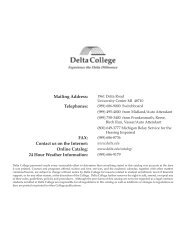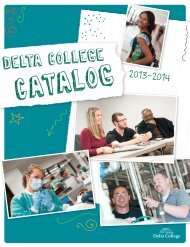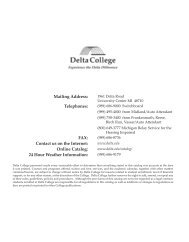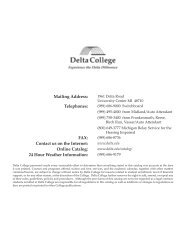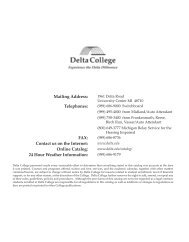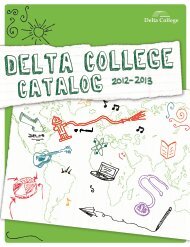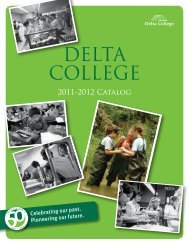Students - Delta College
Students - Delta College
Students - Delta College
Create successful ePaper yourself
Turn your PDF publications into a flip-book with our unique Google optimized e-Paper software.
III. Faculty and Staff Responsibilities.<br />
Faculty should do the following, where applicable and when appropriate:<br />
A. Provide clarification about the nature of academic dishonesty.<br />
B. Clarify expectations for homework, assignments, collaborative<br />
student efforts, research papers, exams, etc.<br />
C. Identify any specific style/format requirements for assignments.<br />
D. Communicate ethical and professional standards associated with<br />
courses and programs.<br />
E. Honor principles of truth and honesty and in so doing protect<br />
the validity of college grades.<br />
1 Plagiarism is defined as, “the false assumption of authorship; the wrongful act of taking<br />
the product of another person’s mind and presenting it as one’s own.” As developed by<br />
Alexander Lindey in “Plagiarism and Originality” (N.Y.: Harper,1952)<br />
IV. Student Responsibilities and Rights<br />
<strong>Delta</strong> <strong>College</strong> <strong>Students</strong> are responsible for understanding/following<br />
A. All provisions of this policy including, but not limited to, examples<br />
under I and II above.<br />
B. Specific course policies for academic work.<br />
C. Other <strong>College</strong> policies as specified in the current <strong>Delta</strong> <strong>College</strong><br />
Catalog.<br />
D. Commonly understood principles of personal honesty and<br />
integrity.<br />
The student may appeal, through the Disputed Final Grades policy,<br />
any grade affected by a charge of academic dishonesty.<br />
V. Process for Policy Violations by <strong>Students</strong><br />
Integrity of Academic Work<br />
I. Statement of Values<br />
The principles of truth and honesty are fundamental to a community of<br />
learners. All members of the <strong>Delta</strong> <strong>College</strong> Community are expected to<br />
honor these principles and are responsible for maintaining the integrity<br />
of academic work at the <strong>College</strong>.<br />
Plagiarism or any misrepresentation of work, unsanctioned collaboration,<br />
use of prohibited materials, and participation in any form of dishonesty<br />
all constitute violation of this policy.<br />
Violations of this policy will result in the actions and consequences<br />
specified within this policy.<br />
II. Faculty determine standards of integrity for academic coursework.<br />
Examples of academic dishonesty that would constitute violations of<br />
this policy include, but are not limited to, the following:<br />
A. Plagiarism 1<br />
B. Cheating on tests, quizzes, or any assignments<br />
C. Fabrication<br />
D. Aiding and abetting dishonesty<br />
E. Falsification of records and official documents<br />
A. Faculty may use their discretion and judgment in any suspected<br />
violation of this policy, including limiting action to a warning. If<br />
the faculty member determines that this policy has been violated,<br />
then the process outlined below will be followed.<br />
1. If the faculty member decides that a violation of this policy will<br />
not affect the student’s assignment or course grade, the faculty<br />
member will explain the violation to the student and warn<br />
the student of future consequences for similar behavior.<br />
2. If a faculty member decides that a violation of this policy will<br />
affect the student’s grade in the course, then the faculty member<br />
will explain the decision in writing to the student within a<br />
reasonable time frame. The faculty member will then send<br />
copies of the written explanation to the appropriate Division<br />
Chair, Academic Dean, and the Chief Academic Officer of the<br />
<strong>College</strong>.<br />
Both the Division Office and Academic Office will maintain<br />
permanent records of these violations.<br />
B. When a violation is reported to the Academic Office, the Chief<br />
Academic Officer of the <strong>College</strong> will determine appropriate<br />
consequences beyond the course grade for the student, including,<br />
particularly in the case of a repeated violation of this policy,<br />
possible dismissal from the <strong>College</strong>.<br />
VI. Process for Policy Violations by <strong>Delta</strong> <strong>College</strong> Faculty and<br />
Staff<br />
Suspected violations will be reviewed by the Senate President<br />
and the <strong>College</strong> President and may be investigated by an ad hoc<br />
committee appointed and charged by them. The membership of<br />
any such committee will represent the appropriate <strong>College</strong> groups.<br />
After an investigation of suspected violation, this committee may<br />
recommend further action to the <strong>College</strong> President.<br />
200 <strong>Delta</strong> <strong>College</strong> 2009-2010



